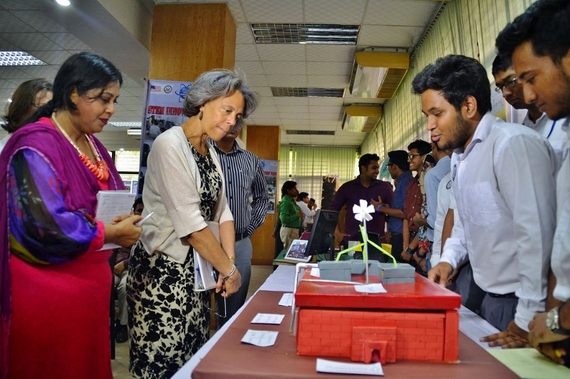Kazi Nasrin Siddiqa is clear about the direction Bangladesh needs to take in STEM education. "We need more scientists and innovators and only proper STEM education can hold the key [to] this success."
A teacher and a vocal advocate of STEM (Science, Technology, Engineering, and Mathematics) education, Siddiqa points to the successes of tiger economies like India, China, Malaysia, and Singapore as examples of how investment in STEM has led to overall economic improvements.
Bangladesh, which has been described by Forbes as a "capitalist haven," indeed seems poised for growth. "Many new opportunities and jobs are being created in the IT industries, medicine, engineering, and bio-technology," Siddiqa notes. "If we can educate our students properly in STEM, it will ultimately bring a tremendous change in our economy."
As Founder and President of Education & Cultural Society (ECS), Siddiqa works to advance STEM education for all students in Bangladesh in collaboration with other teachers, several of whom, like herself, are alumni of international exchange initiatives such as the International Leaders in Education Program (ILEP).
Her time on ILEP inspired her greatly. The four-month fellowship, implemented by IREX, exposed Siddiqa to new educational methods, expanded her ability to use technology in the classroom, and introduced her to other teachers from the U.S. and around the world. It also broadened her vision to create change beyond a single classroom or school.
"While I was in DC, I really took to heart something that IREX staff told me: 'Go back and work for your education system.' So that's what I've been doing," she says.
Her organization recently trained teachers from 25 different schools around the greater Dhaka area in STEM education, hosted a Grand STEM Innovation Fair with more than 700 students and educators, and helped to launch 20 Science and Environment Clubs across the country.
They've also held science fairs in underdeveloped schools, which have led to the creation of student projects on rooftop gardening, eco-friendly weaving, and school cleanliness. "For the first time students of those schools came to know the real implementation of science and environmental studies out of their text books," she says.
Though there have been advancements, Siddiqa adds, "Bangladesh is still far away from the current STEM wave." She stresses the lack of planning for a future education policy, the inability to inform students about high-demand job sectors, and barriers to girls' participation in STEM education and careers.
While she notes that girls' education is progressing rapidly in Bangladesh, "Gender stereotypes often leave girls behind in STEM education," and "they often do not get encouragement from family and schools." According to Human Rights Watch, Bangladesh has the world's highest rate of child marriage of girls under the age of 15, with lower rates of education being cited by some sources as "both a cause and effect of early marriage."
Despite the challenges, Siddiqa, her colleagues, and collaborators remain undeterred and aim to establish science clubs in every district of Bangladesh, "We want to create an environment where our students will celebrate STEM education with fun and excitement ... Then our kids would be creative thinkers and problem solvers."
The International Leaders in Education Program (ILEP) is a program of the U.S. Department of State's Bureau of Educational and Cultural Affairs and administered by IREX.

